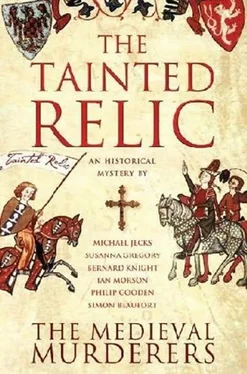It took some time to make their way through the crowds and reach the riverside quays. These were a series of ramshackle piers, used to unload goods brought on the flat-bottomed boats that traversed the fens. The active ones in the southern part of the town were in better repair than the disused ones behind Michaelhouse, and it was to the dilapidated set that the beadle led them. The jetty Michaelhouse owned was among those that were virtually derelict, and anyone venturing on to it was taking his life in his hands. The area surrounding it was seedy and abandoned.
Tomas looked around. ‘I do not like this place. It feels eerie.’
‘Only because it is quiet after the hubbub of the main roads,’ said Bartholomew, who was used to it. ‘It can be quite pleasant on a balmy summer evening.’
‘Well, it is not pleasant now,’ retorted Tomas sharply. ‘On a blazing afternoon with the sun at its hottest and more flies than leaves on the trees.’
Because July had been so dry, the river was considerably lower than usual. Stripes of dried black slime on the jetty’s legs showed it was down by half the height of a man. The beadle pointed, and Bartholomew saw someone standing in the chest-high water at the end of the pier. The figure was leaning forward, so its head was just below the surface. A group of people had gathered to gawk at the spectacle, and Bartholomew saw Urban among them, sitting on a discarded barrel with his head in his hands. He appeared to be crying.
‘We left the body where it was, so you could see for yourself,’ said the beadle to Michael. He frowned. ‘It is an odd way to die. If he had stood up straight, his head would have been above the water, and all he would have had to do was call for help. There was no need for him to drown.’
Before the monk could reply, Tomas darted forward and began to wade towards the corpse. The river shelved quickly, and water soon reached his waist. In his haste, he stumbled and disappeared completely. Bartholomew tensed, half expecting to be looking for a second body. The river was not deep, but its bottom was foul, and it was not unknown for a man’s legs to become entangled in weeds or mud and for him to find himself unable to reach air again. But Tomas burst spluttering to the surface, and continued to make his way to the pathetic figure that bobbed up and down in the waves he created.
Bartholomew inched his way along the pier, aware that the boards had become very much more rotten since he had last ventured on to them. He warned Michael to stay where he was, suspecting the whole thing might collapse if too much weight was placed on it. When he reached the end, he knelt, noting that some of the planks had recently snapped off. The new breaks were bright, contrasting starkly with the dark green of the weathered ones. Tomas was just below him, struggling to lift Andrew’s face above the surface. It was already far too late, but Tomas urged him to breathe anyway.
‘There is nothing you can do,’ said Bartholomew, leaning down to touch his shoulder. ‘He has been dead too long.’
‘His feet are stuck,’ said Tomas in a voice that held a hint of panic. ‘I cannot pull him out.’
‘Mud,’ explained Bartholomew. ‘It is notoriously sticky in this part of the river, which is why no one is swimming here, even though the day is hot. Folk know to bathe elsewhere.’
‘Andrew was a stranger,’ said Tomas bitterly. ‘He did not know to avoid this stretch of water. Besides, the mud is not as thick as you think. I am standing next to him, but I can still extricate my feet.’
Bartholomew regarded him intently. ‘What are you saying? That something else is holding him there?’
Tomas rubbed a shaking hand over his eyes. ‘I do not know. However, I can tell you one thing: the pouch containing his relic has gone.’
‘Perhaps it was washed off during his death struggles. He told us Witney had damaged the cord that held it around his neck.’
‘He would not have been that careless-not when he knew its loss would mean his death.’
‘Give me his hands,’ instructed Bartholomew. He saw where the Dominican was going with his assumptions, but was loath to accept that the relic had claimed another victim. ‘I will pull him up.’
Tomas obliged, and Bartholomew took the frail arms and braced himself to haul. It was harder than he had imagined, and he was beginning to think he might have to enlist help when the river finally yielded its prize with a sticky plop and a gurgle of thick, black mud. He pulled the body on to the pier and knelt to examine it.
There was little to see. There was no wound on Andrew’s head to indicate he might have been stunned before he entered the water, and no marks on hands or arms to suggest he had been involved in a struggle. He leaned on the old man’s chest and watched frothy bubbles emerge from his mouth, leading him to suspect drowning as the cause of death. The only odd thing was that Andrew’s pupils had contracted to tiny points, no larger than the hole made by a needle. While Tomas waded out of the river, Bartholomew carried the old man to the bank, where Urban was waiting. Michael took Bartholomew’s arm and tugged him to one side.
‘I have just spoken to Urban. He tells me Andrew was ill last night, and was beginning to accept that he might not have the strength to carry his True Cross to Norwich. He said he went out this morning, and when he returned, he no longer had the relic.’
‘He lost it?’ asked Bartholomew, slow to understand.
‘He gave it to someone,’ explained Michael. ‘Someone who would take it north. Then he told Urban that he would die today, and, sure enough…’
‘I thought his plan was to pass the thing to Urban,’ interrupted Bartholomew, refusing to accept that some ancient curse was the cause of the old man’s death.
‘So did Urban.’
‘I saw them earlier today,’ said Bartholomew, struggling to recall whether the pouch had been around Andrew’s neck at the time. He decided it was not, and concluded that Andrew must have just returned from passing it to his elected carrier. The old man had been tired, and the physician recalled his relief as he had sat on the churchyard wall. Urban, perching next to him, had been weeping-perhaps because he had just been told that he was not to be trusted with his master’s quest. Had the novice been sufficiently hurt by the lack of trust to kill his master?
Bartholomew stared at Andrew’s pale, water-logged features and wondered whether he had believed so strongly that he would die once the True Cross was out of his possession that he had jumped into the river of his own accord. The mind exerted a powerful force on the body, and it would not be the first time a man had willed himself to death.
Because Andrew was a visitor to Cambridge, and Urban seemed incapable of dealing with his master’s body, it was Michael who arranged for it to be taken to St Botolph’s Church. Bartholomew, Tomas and Urban carried the sad burden, and when they arrived Tomas took Urban to pray in the chancel, while Bartholomew manhandled Andrew into the parish coffin and Michael hunted for candles. When they had completed their sorry duties, Bartholomew studied Urban. His face was tear-streaked, and his shoulders slumped, as though he had been deprived of something very dear to him. The physician could not decide whether the loss related to his teacher, or to the fact that the relic was gone and he was no longer obliged to play a part in its journey.
‘Tomas is interrogating him,’ said Michael, watching. ‘Except his enquiries sound rather more desperate and meaningful than did mine.’
Bartholomew watched the Dominican, and conceded that Michael was right. The expression on Tomas’s face was more agonized than an informal discussion warranted, and it was clear that Andrew’s death-or perhaps the disappearance of the relic-had grieved him as deeply as it had Urban. He walked over to them, wanting to hear what was said for himself. While Tomas’s reaction to Andrew’s sudden demise was odd, he still liked the man, and did not want Michael to draw all the conclusions regarding his behaviour.
Читать дальше












